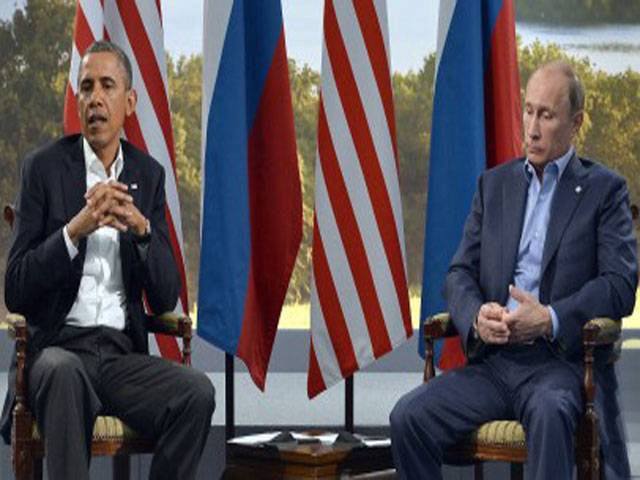Obama complained Friday that Russia had adopted a frostier stance towards the United States since Vladimir Putin's return to the Kremlin, but both camps insisted ties have not broken down.
"I don't have a bad personal relationship with Putin," Obama told reporters at a White House press conference."When we have conversations, they're candid, they're blunt; oftentimes, they're constructive.
"I know the press likes to focus on body language and he's got that kind of slouch, looking like the bored kid in the back of the classroom. But the truth is, is that when we're in conversations together, oftentimes it's very productive," the president said.
Washington and Moscow are at loggerheads over the war in Syria, the fate of US intelligence leaker Edward Snowden, missile defense, nuclear disarmament and human rights.
And so great is the gulf between the former Cold War foes on many of these issues that Obama this week canceled a planned summit meeting with Putin next month.
On Friday, as Russia's defense and foreign ministers met in Washington with their US counterparts, Obama said Putin's return to the Russian presidency in May 2012 had cast a chill over thawing ties.
"I think there's always been some tension in the US-Russian relationship after the fall of the Soviet Union," Obama said.
"There's been cooperation in some areas. There's been competition in others. It is true that in my first four years in working with President Medvedev, we made a lot of progress."
Medvedev ruled Russia between 2008 and 2012 while then former president Putin took a turn as prime minister -- having first boosted the powers of the office -- before returning to the top job.
The interregnum saw a brief flowering of joint US-Russian projects, including a new strategic arms reduction treaty and a deal that saw Russia help supply US forces in Afghanistan.
"What's also true is, is that when President Putin... came back into power, I think we saw more rhetoric on the Russian side that was anti-American, that played into some of the old stereotypes about the Cold War," Obama said.
"And I've encouraged Mr Putin to think forward as opposed to backwards on those issues. With mixed success."
Obama however said he was against a boycott of Russia's Winter Olympics next year over a controversial new law banning "homosexual propaganda."
"I want to just make very clear right now, I do not think it's appropriate to boycott the Olympics," Obama said.
"We've got a bunch of Americans out there who are training hard. Who are doing everything they can to... succeed."
There is a precedent: the United States boycotted the 1980 Moscow Summer Olympics in the wake of the Soviet Union invasion of Afghanistan.
As Obama was addressing reporters, Russian Foreign Minister Sergei Lavrov was sparring with his US counterpart John Kerry just across Washington at the State Department.
Lavrov acknowledged that ties were strained, but played down talk of a return to the confrontation of the era when the West faced off against the former Soviet bloc.
"It's clear there is no Cold War that we should expect," Lavrov said of US-Russian relations after a meeting in Washington. "We shouldn't expect any aggravation."
"The overall mood was very positive, which inspires optimism," he added, after talks with Kerry, US Defense Secretary Chuck Hagel and Russian defense minister Sergei Shoigu.
The most immediate barrier to warmer relations is the case of Edward Snowden, a former US intelligence contractor who fled to Moscow after revealing details of the US National Security Agency's vast electronic spy networks.
Washington has demanded his extradition to face espionage charges, and was outraged when Moscow decided last month to grant him political asylum.
Lavrov said, however, that the row had not "overshadowed" talks on other issues.
Earlier, Kerry acknowledged the two nations were facing "challenging moments" but said he hoped for a frank exchange of views.
He noted that both he and his Russian counterpart Lavrov play ice hockey.
"We both know that diplomacy is like hockey and sometimes results in occasional collisions," Kerry said.
Despite the Snowden case, Kerry said he hoped to work with Russia on Syria, especially to organize a long-delayed peace conference in Geneva.
Russia provides key support to Syria's embattled President Bashar al-Assad in the civil war that the United Nations said has claimed more than 100,000 lives since 2011.
The United States supports "non-lethal" aid to the rebels, who are backed by US-allied Sunni Arab monarchies Qatar and Saudi Arabia.
"Sergei and I do not always agree completely on responsibility for the bloodshed or on some of the ways forward," Kerry said. But, he continued, "both of us and our countries agree that to avoid institutional collapse and descent into chaos, the ultimate answer is a negotiated political solution."
Lavrov agreed on the need for a peace process but said that a top priority should be to "fight terrorists," the term both Damascus and Moscow use for the Syrian rebels.
US missile plans in Europe have long been a sore point for Russia, which charges that the missile shield is designed to reduce the deterrent effect of Moscow's arsenal and thus alter the balance of power on the continent.
Friday, April 19, 2024
Obama: Putin's Cold War stance chills ties

9:58 PM | April 18, 2024
Hepatitis Challenge
April 18, 2024
IMF Predictions
April 18, 2024
Wheat War
April 18, 2024
Rail Revival
April 17, 2024
Addressing Climate Change
April 17, 2024
Justice denied
April 18, 2024
AI dilemmas unveiled
April 18, 2024
Tax tangle
April 18, 2024
Workforce inequality
April 17, 2024
New partnerships
April 17, 2024
ePaper - Nawaiwaqt
Advertisement
Nawaiwaqt Group | Copyright © 2024





